Black History Month Spotlight: Bill Russell
02/03/2022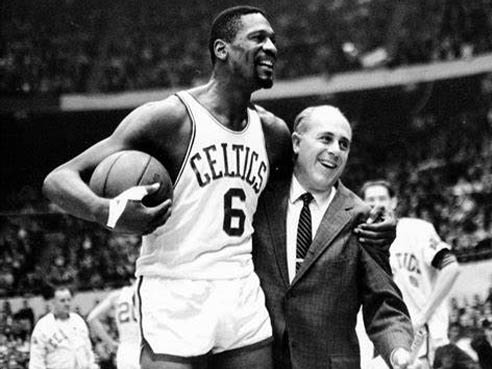
Black History Month is an annual celebration of the achievements by Black Americans and a time for recognizing their impact in U.S. history. For the first week in February 2022, we commemorate National Basketball Association great and AAU alum, Bill Russell.
By: Troy MacNeill
ORLANDO, Fla. (2022) -- Bill Russell, born on February 12, 1934, is more than just basketball’s most accomplished winner. More than an athlete, he is a passionate activist who broke barriers both on and off the court.
Russell strived for the best in multiple walks of life. Before he began winning championships and collecting accolades, Russell was just a tall, athletic kid trying to understand the game of basketball and the ways of life in 1950s America.
Minneapolis Lakers superstar, National Basketball Association (NBA) Hall of Famer and Russell’s childhood hero, George Mikan once said of Russell while he was playing in college, “Let’s face it, he’s the best ever. He’s so good, he scares you.”
But basketball did not always come easy to Russell. He was also athletic, could run and jump with the best of them, but he simply did not understand the game of basketball. Cut from his Junior High team, Russell may have left basketball behind forever. Until his high school coach, Georg Powles encouraged Russell to work with him on fundamentals.
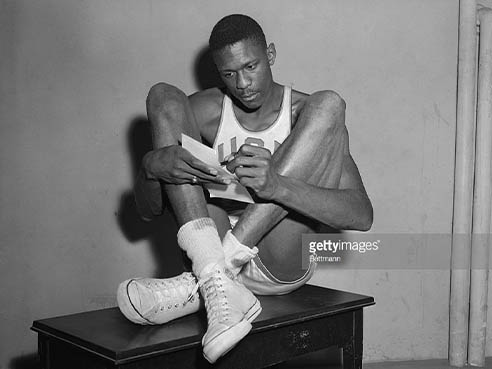
Russell began to work hard and reinvented the way basketball defense was played forever. Back in early 50s, defense was played flatfooted. Russell changed that strategy by using his raw athleticism, refined footwork, and instincts to jump and block shots.
After winning 3 state championships in high school, most college scouts still didn’t understand Russell’s unorthodox defensive style. The only school to offer him a scholarship was the University of San Francisco (USF). Russell knew basketball could be his chance to escape poverty and fight against the racism he faced in everyday life.
Russell began to change the norm while at USF both on and off the court. While Black American players were still a rarity in college basketball, the USF team, captained by Russell, became the first team to feature 3 African Americans in the starting lineup. The rules of basketball also began to change thanks to Russell, as the NCAA implemented a number of changes referred to as “Russell’s Rules.”
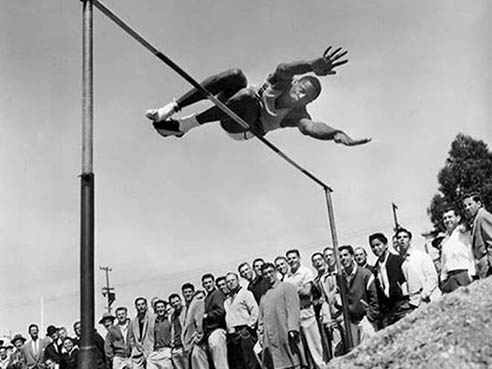
While at USF, Russell began to get a taste of success as an athlete. Russell led USF to back-to-back NCAA Championships in 1955 and 1956, winning 55 consecutive games. Aside from basketball, Russell also dominated in Track and Field while at the college. Russell was a standout in the high jump, being ranked the seventh-best high jumper in the world by Track & Field News in 1956. That year, Russell would win the high jump titles at the Central California Amateur Athletic Union (AAU) meet, the Pacific AAU meet, and the West Coast Relays.
That same year, Russell was made the captain of the U.S. National Basketball team as they competed in the 1956 Summer Olympics and won the gold medal. Later that year Russell would begin his storied NBA career with the Boston Celtics.
As soon as Russell was drafted by Boston in 1956, he started to break records on his journey to becoming one of the greatest players to ever step foot on the court. Russell won his first NBA Finals Championship in his first year with the team, playing a pivotal role and making the game sealing block against the St. Louis Hawks. That would not be his last time in the NBA Finals spotlight.
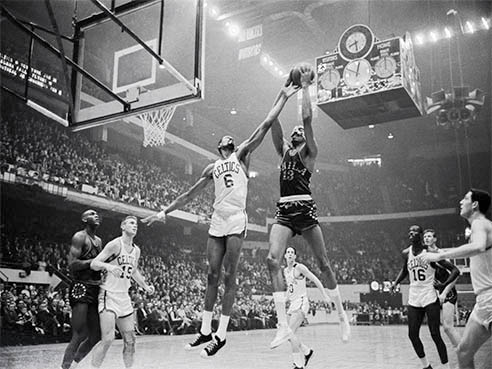
Russell would go on to win 11 total NBA Championships, 8 consecutive from 1959 through 1966. Russell was the face of the Celtics and one of the best rebounders and defensive players in the history of the game. He would become the NBA’s Most Valuable Player 5 times in his career, thanks to feats such as becoming the first player to record 50 rebounds in a single game.
Even with all of his success as a player, Russell is also recognized as a trailblazer and one of life’s best humanitarians.
Russell broke barriers for Black American players, coaches, and people of all walks of life. In the 1965-66 NBA season, Russell became the first black head coach in the league’s history, as well as the first black head coach in any professional sport. He was named head coach of the Boston Celtics, where he acted as a player-coach for 3 years. In 1975, Russell became the first African American to be inducted into the NBA Hall of Fame.
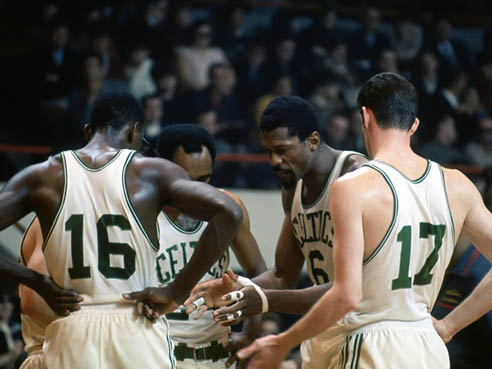
Although Russell joined the Celtics nearly 10 years after Jackie Robinson had integrated baseball and six seasons after Earl Lloyd did the same for the NBA, racism was still a very real issue to be faced in 1956. Racial tensions were high all around the world. But Russell never strayed from his convictions.
Away from the court, Russell was a prominent activist in the fight for social justice. He did not wait until it was safe for him to stand up for what he believed. Russell stood by his convictions and fought for social rights in the midst of his prime playing years.
At only 29 years old, Russell joined Dr. Martin Luther King Jr. in the March on Washington. He stood in the front row and watched the iconic “I Have a Dream” speech. He later became an active member of the NAACP. He stood with fellow athlete Muhammad Ali at the famed “Cleveland Summit” to support the boxer’s refusal to be drafted into the Army. In 1963, after the assassination of activist Medgar Evers, Russell traveled to the heavily segregated Jackson, Mississippi to run a basketball clinic.
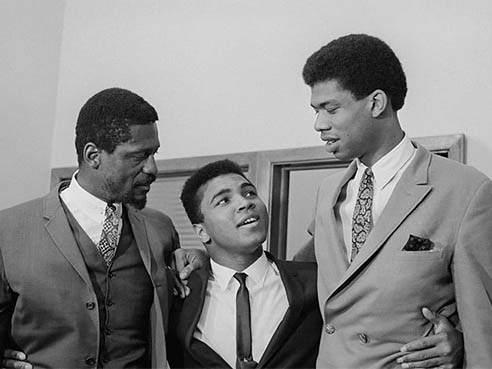
Even in the height of his career, Russell knew he had to do something to make a difference. Russell stated in an interview that his father always said to him, “I don’t know what you’re gonna do when you grow up, but don’t do it if you can’t do it right.” Because of those words, Russell wanted to be the best he could be by teaching others how to love.
Kobe Bryant when talking about Russell said, “Bill has led the way that inspires us, the next generation, to follow his lead.”
In 2011, Russell received the Presidential Medal of Freedom, America’s highest civilian award, for his part in civil rights activism, and being an impassioned advocate. The NBA Finals MVP Trophy was named after Russell in 2009. In 2017, Russell was named the inaugural recipient of the NBA Lifetime Achievement Award and in 2020, he was named a winner of the Mannie Jackson – Basketball’s Human Spirit Award for his decades-long commitment to social justice.
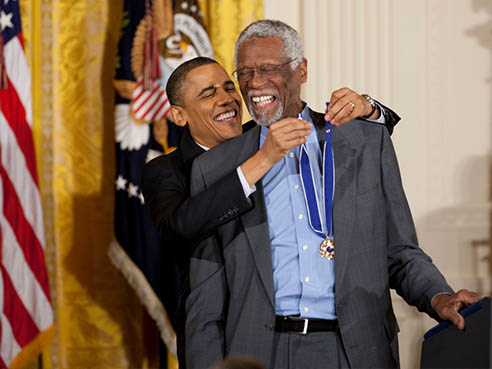
In today’s NBA, Russell is honored by players past and present and widely regarded as one of the best players ever and the most prolific winner across any sport. At 87 years old, he continues to fight for social justice and continues to teach others how to love one another.

ORLANDO, Fla. (2022) -- Bill Russell, born on February 12, 1934, is more than just basketball’s most accomplished winner. More than an athlete, he is a passionate activist who broke barriers both on and off the court.
Russell strived for the best in multiple walks of life. Before he began winning championships and collecting accolades, Russell was just a tall, athletic kid trying to understand the game of basketball and the ways of life in 1950s America.
Minneapolis Lakers superstar, National Basketball Association (NBA) Hall of Famer and Russell’s childhood hero, George Mikan once said of Russell while he was playing in college, “Let’s face it, he’s the best ever. He’s so good, he scares you.”
But basketball did not always come easy to Russell. He was also athletic, could run and jump with the best of them, but he simply did not understand the game of basketball. Cut from his Junior High team, Russell may have left basketball behind forever. Until his high school coach, Georg Powles encouraged Russell to work with him on fundamentals.

Russell began to work hard and reinvented the way basketball defense was played forever. Back in early 50s, defense was played flatfooted. Russell changed that strategy by using his raw athleticism, refined footwork, and instincts to jump and block shots.
After winning 3 state championships in high school, most college scouts still didn’t understand Russell’s unorthodox defensive style. The only school to offer him a scholarship was the University of San Francisco (USF). Russell knew basketball could be his chance to escape poverty and fight against the racism he faced in everyday life.
Russell began to change the norm while at USF both on and off the court. While Black American players were still a rarity in college basketball, the USF team, captained by Russell, became the first team to feature 3 African Americans in the starting lineup. The rules of basketball also began to change thanks to Russell, as the NCAA implemented a number of changes referred to as “Russell’s Rules.”

While at USF, Russell began to get a taste of success as an athlete. Russell led USF to back-to-back NCAA Championships in 1955 and 1956, winning 55 consecutive games. Aside from basketball, Russell also dominated in Track and Field while at the college. Russell was a standout in the high jump, being ranked the seventh-best high jumper in the world by Track & Field News in 1956. That year, Russell would win the high jump titles at the Central California Amateur Athletic Union (AAU) meet, the Pacific AAU meet, and the West Coast Relays.
That same year, Russell was made the captain of the U.S. National Basketball team as they competed in the 1956 Summer Olympics and won the gold medal. Later that year Russell would begin his storied NBA career with the Boston Celtics.
As soon as Russell was drafted by Boston in 1956, he started to break records on his journey to becoming one of the greatest players to ever step foot on the court. Russell won his first NBA Finals Championship in his first year with the team, playing a pivotal role and making the game sealing block against the St. Louis Hawks. That would not be his last time in the NBA Finals spotlight.

Russell would go on to win 11 total NBA Championships, 8 consecutive from 1959 through 1966. Russell was the face of the Celtics and one of the best rebounders and defensive players in the history of the game. He would become the NBA’s Most Valuable Player 5 times in his career, thanks to feats such as becoming the first player to record 50 rebounds in a single game.
Even with all of his success as a player, Russell is also recognized as a trailblazer and one of life’s best humanitarians.
Russell broke barriers for Black American players, coaches, and people of all walks of life. In the 1965-66 NBA season, Russell became the first black head coach in the league’s history, as well as the first black head coach in any professional sport. He was named head coach of the Boston Celtics, where he acted as a player-coach for 3 years. In 1975, Russell became the first African American to be inducted into the NBA Hall of Fame.

Although Russell joined the Celtics nearly 10 years after Jackie Robinson had integrated baseball and six seasons after Earl Lloyd did the same for the NBA, racism was still a very real issue to be faced in 1956. Racial tensions were high all around the world. But Russell never strayed from his convictions.
Away from the court, Russell was a prominent activist in the fight for social justice. He did not wait until it was safe for him to stand up for what he believed. Russell stood by his convictions and fought for social rights in the midst of his prime playing years.
At only 29 years old, Russell joined Dr. Martin Luther King Jr. in the March on Washington. He stood in the front row and watched the iconic “I Have a Dream” speech. He later became an active member of the NAACP. He stood with fellow athlete Muhammad Ali at the famed “Cleveland Summit” to support the boxer’s refusal to be drafted into the Army. In 1963, after the assassination of activist Medgar Evers, Russell traveled to the heavily segregated Jackson, Mississippi to run a basketball clinic.

Even in the height of his career, Russell knew he had to do something to make a difference. Russell stated in an interview that his father always said to him, “I don’t know what you’re gonna do when you grow up, but don’t do it if you can’t do it right.” Because of those words, Russell wanted to be the best he could be by teaching others how to love.
Kobe Bryant when talking about Russell said, “Bill has led the way that inspires us, the next generation, to follow his lead.”
In 2011, Russell received the Presidential Medal of Freedom, America’s highest civilian award, for his part in civil rights activism, and being an impassioned advocate. The NBA Finals MVP Trophy was named after Russell in 2009. In 2017, Russell was named the inaugural recipient of the NBA Lifetime Achievement Award and in 2020, he was named a winner of the Mannie Jackson – Basketball’s Human Spirit Award for his decades-long commitment to social justice.

In today’s NBA, Russell is honored by players past and present and widely regarded as one of the best players ever and the most prolific winner across any sport. At 87 years old, he continues to fight for social justice and continues to teach others how to love one another.

 Email
Email Print
Print









